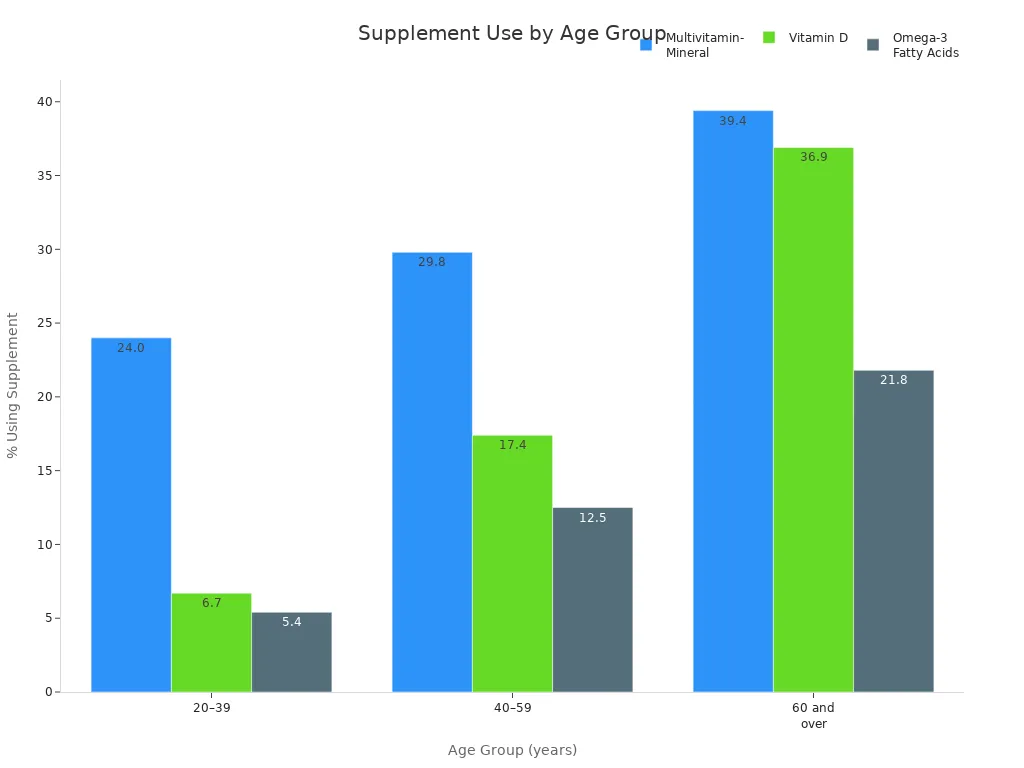How Supplements to Take Effect Work in Your Body
Table of Contents

You might wonder how long it takes for supplements to take effect in your body. The answer depends on many things, like the type of supplement and your own health. Some supplements work fast, while others need time and steady use. Your body absorbs water-soluble and fat-soluble supplements in different ways. Consistency matters, and you should watch for possible interactions. Over half of U.S. adults use supplements, with multivitamins, vitamin D, and omega-3s as top choices.

Supplements to Take Effect
Absorption Basics
When you take supplements, your body starts working right away to break them down and use them. The process begins in your mouth and continues through your stomach and intestines. Your digestive system uses both mechanical and chemical actions to help your body absorb nutrients. Chewing breaks food and supplements into smaller pieces. Stomach acids and enzymes then help dissolve them even more.
Here’s a simple table to show you the main steps your body uses to absorb supplements:
| Biological Process | Description | Key Mechanisms and Sites |
|---|---|---|
| Mechanical Digestion | Breaks down food and supplements into smaller pieces | Chewing, stomach churning, movement in intestines |
| Chemical Digestion | Uses enzymes to turn big molecules into smaller, usable ones | Amylase (carbs), proteases (proteins), lipase (fats), nucleases (nucleic acids) |
| Emulsification | Breaks down fats so your body can absorb them | Bile salts make fats into tiny droplets called micelles |
| Absorption | Moves nutrients from your gut into your blood | Passive diffusion, active transport, micelle-mediated absorption |
| Specific Absorption Sites | Different nutrients get absorbed in different parts of your intestines | Jejunum (carbs, proteins), ileum (vitamin B12, bile salts), duodenum (iron, calcium) |
| Protective Mechanisms | Keeps your gut lining safe during digestion | Mucous barrier, new cells replace old ones |
Your body uses these steps for all kinds of supplements, including vitamins, minerals, and probiotics. For example, probiotics need to survive stomach acid before they reach your intestines, where they can help with digestion and immune support. If you want your supplements to take effect, you need to make sure your digestive system is healthy and working well.
Tip: Drinking enough water and eating a balanced diet can help your body absorb supplements better and boost immune support.
Water-Soluble vs. Fat-Soluble
Not all supplements work the same way in your body. Some dissolve in water, while others need fat to be absorbed. You can group most vitamins into two types: water-soluble and fat-soluble.
-
Water-Soluble Vitamins:
These include vitamin C and all the B vitamins. Your body absorbs them quickly because they dissolve in water and go straight into your bloodstream. You do not store them for long, so you need to take them often. For example, if you take vitamin C for immune support, you might notice results in just a few days to two weeks. Your body gets rid of any extra through urine, so you need to keep taking these supplements to take effect. -
Fat-Soluble Vitamins:
These include vitamins A, D, E, and K. Your body needs fat from your food to absorb these vitamins. They travel through your intestines with the help of bile salts and get stored in your liver and fat tissues. Because your body stores them, it takes longer for these supplements to take effect. You might need weeks or even months to see the full impact, especially if you are using them for immune support or bone health.
Here’s a quick list to help you remember the differences:
-
Water-soluble vitamins:
- Absorbed quickly
- Not stored in large amounts
- Need to be taken more often
- Examples: vitamin C, B vitamins
-
Fat-soluble vitamins:
- Need fat for absorption
- Stored in liver and fat tissue
- Take longer to build up in your body
- Examples: vitamins A, D, E, K
Supplements like probiotics work differently. They are living bacteria that help balance your gut. They can support your immune system, but they need to survive the trip through your stomach to reach your intestines. If you want these supplements to take effect, you should take them as directed, often with food.
The way your body absorbs supplements can have a big impact on how fast you notice results. If you want better immune support, you need to choose the right type of supplement and take it the right way. Pair fat-soluble vitamins with a meal that has some healthy fat. Take water-soluble vitamins with water. This helps your supplements to take effect and gives your body the best chance to use them well.
Timelines for Results

How Long Does It Take for Vitamins to Work
You probably want to know how long does it take for vitamins to work after you start taking them. The answer depends on the type of vitamin, your health, and your habits. Water-soluble vitamins, like vitamin C and B vitamins, move quickly through your body. If you are low on these vitamins, you might feel more energy or better immune support in just a few days. Fat-soluble vitamins, such as vitamin D, A, E, and K, take longer. Your body stores them in fat and the liver, so you may need weeks or months before you see an observable change.
Here’s a table to help you understand the timeframe for common supplements:
| Supplement Type | Typical Timelines to Notice Effects | Example Benefits |
|---|---|---|
| Water-soluble vitamins | Days to 2 weeks | More energy, immune support |
| Fat-soluble vitamins | Weeks to months | Stronger bones, better vision |
| Magnesium | 24 hours to 2 weeks | Less muscle cramps, less fatigue |
| Probiotics | Days to weeks | Better digestion, immune support |
| Herbal supplements | Weeks to months | Less stress, better sleep |
If you take magnesium for muscle cramps, you might feel relief in 24 to 48 hours, especially if you use magnesium citrate. Fatigue from low magnesium can get better in a few days or weeks. The speed depends on your magnesium level, the form you use, and your diet. Eating raw veggies and keeping your vitamin D up can help magnesium work faster.
How Long Do Vitamins Take to Work
You may ask how long do vitamins take to work for your body. The answer is not the same for everyone. Your baseline nutrient levels matter. If you are very low in vitamin D, you might notice stronger bones or better immune support after a few weeks. If your levels are normal, changes may take longer. Women sometimes respond faster to vitamin D than men. Your habits, like how much sun you get or how active you are, also change the timelines.
Probiotics work in a different way. These living bacteria help your gut and immune support. You may notice less bloating or better digestion in a few days, but full benefits can take weeks. You need to take probiotics regularly for the best results.
Note: If you want to know when you will start to notice the benefits, keep track of your symptoms and energy levels. Write down changes each week. This helps you see progress and spot any problems.
Immediate vs. Long-Term Effects
Some supplements give you quick results. Others need time to build up in your body. Magnesium can relax your muscles and ease cramps in just a day or two. Vitamin C boosts immune support fast if you are low. Herbal supplements, like ashwagandha or ginseng, usually need weeks or months for full effects. You may not feel anything right away, but over time you might sleep better, feel less stress, or have more energy.
Here’s a simple list to show the difference:
-
Immediate effects:
- Magnesium: muscle relaxation, less soreness (within days)
- Vitamin C: immune support, more energy (within days)
- Probiotics: better digestion, less bloating (within days to weeks)
-
Long-term benefits:
- Vitamin D: stronger bones, better immune support (weeks to months)
- Herbal supplements: less anxiety, better sleep, improved athletic performance (weeks to months)
- Probiotics: balanced gut, stronger immune support (weeks to months)
The timeframe for common supplements can change based on your health, habits, and the type of supplement. If you want faster results, stay consistent and follow directions. Some people see changes quickly, while others need more time. Your body is unique, so your timelines may not match someone else’s.
Tip: If you do not see an observable change after a few months, talk to your doctor. You may need a different dose or another type of supplement.
Factors Affecting Effectiveness

Individual Health
Your body is unique, so the way you respond to supplements can be very different from someone else. If you already have healthy nutrient levels, you might notice stronger benefits from supplements. People with a nutritional deficiency may see a quick boost at first, but the effect slows down as their body gets closer to normal levels. Some nutrients need others to work well. For example, you might see better results from omega-3s if you also take a multivitamin. This is called co-nutrient optimization. If you lack certain nutrients, it can limit how well other supplements work. Genetics also play a role. Your genes can change how your body absorbs and uses vitamins. Some people need more of a vitamin because of their DNA. These are all factors that affect vitamin efficacy.
Tip: Eating a balanced diet and knowing your baseline nutrient levels can help you get the most out of your supplements.
Consistency and Dosage
Taking your supplements every day makes a big difference in their effectiveness. Most people who see good results use their supplements daily, not just once in a while. Regular use helps your body keep steady nutrient levels. Here’s a quick look at how daily use compares to sporadic use:
| Habit | Result |
|---|---|
| Daily supplement use | Higher nutrient levels, better effectiveness |
| Sporadic use | Less reliable results, lower effectiveness |
You should also pay attention to dosage. Too much of a good thing can be risky. Some supplements to be cautious about include vitamin D, iron, and vitamin A. Taking more than you need can cause side effects or even toxicity. Always check the label and talk to a healthcare provider if you are unsure.
Watch for Potential Interactions
Supplements can interact with each other and with medicines. Some supplements that work well together, like vitamin D and calcium, can boost absorption. Others can cause problems. For example, St. John’s wort can make some antidepressants less effective, and garlic extracts can increase bleeding risk if you take blood thinners. Always watch for potential interactions, especially if you take prescription drugs. If you notice symptoms like dizziness, rash, or stomach upset, stop the supplement and call your doctor. It’s smart to keep a list of everything you take and share it with your healthcare provider.
Note: Reading labels and choosing high-quality products can help you avoid unwanted interactions and improve the effectiveness of your supplement routine.
Optimizing Supplement Use
Best Timing
You want your supplements to work their best, so timing matters. Some supplements need food, while others work better on an empty stomach. For example, vitamin D absorbs best when you take it with lunch and a meal that has healthy fats like avocado or nuts. Iron works best on an empty stomach, but if it upsets your stomach, you can take it with foods rich in vitamin C, like oranges. Just avoid taking iron with dairy, eggs, caffeine, or fiber because these block absorption. Probiotics do well about 30 minutes before meals or even before bed. This helps them survive stomach acid and reach your gut. If you want maximum impact, consider timing and dosage for each supplement.
Here’s a quick table to help you remember:
| Supplement | Best Time to Take | Absorption Tips |
|---|---|---|
| Vitamin D | With lunch and healthy fat | Take with avocado, nuts, or olive oil |
| Iron | Mid-morning, empty stomach | Pair with vitamin C foods, avoid dairy and caffeine |
| Probiotics | Before meals or bedtime | Take 30 minutes before eating or before bed |
Monitoring Progress
Tracking your progress helps you see if your supplements are working. You can keep a simple journal to write down how you feel each day. Note changes in your energy, sleep, or mood. Some people use apps or online tools to track what they take and how they feel. You can also use a 24-hour food recall to see how supplements fit into your diet. If you want a more detailed approach, some people use databases that list supplement ingredients and nutrients. Regular check-ins help you spot improvements or side effects early.
Tip: Set a reminder to review your progress every week. This helps you stay on track and adjust if needed.
Consulting Professionals
You do not have to figure out supplements alone. When you consult with a healthcare provider, you get advice that fits your needs. Look for someone with training, like a registered dietitian or a Certified Dietary Supplement Professional. They will check your health, diet, and lifestyle. They can help you pick the right supplements, set the right dose, and watch for side effects. These experts focus on your whole health, not just trends. Personalized plans from professionals often lead to better results and lasting changes. They also help you avoid mistakes and make sure your supplements are safe with any medicines you take.
Remember, your health is unique. A professional can help you make smart choices and get the most from your supplement routine.
You’ve learned that supplements work differently for everyone. Some give quick results, while others need time and steady use. Most healthy adults see only small benefits, but certain groups—like older adults or people with special needs—can get more help.
- Always check labels and watch for side effects.
- Talk with your doctor before starting anything new.
Staying patient and tracking your progress helps you spot changes. Remember, whole foods are best, and supplements work best when you use them wisely.
FAQ
How can you tell if a supplement is working?
You might notice more energy, better sleep, or improved mood. Keep a journal to track changes. If you do not see any difference after a few months, talk to your doctor.
Can you take supplements on an empty stomach?
Some supplements, like vitamin C, work fine on an empty stomach. Others, like vitamin D or fish oil, need food with fat for better absorption. Always check the label for best results.
What happens if you miss a dose?
Missing one dose usually does not cause problems. Just take your next dose as scheduled. Do not double up. Consistency helps you get the best results from your supplements.
Are natural supplements always safe?
Natural does not always mean safe. Some herbs and extracts can cause side effects or interact with medicines. Always read labels and talk to a healthcare provider before starting something new.
Should you take supplements if you eat a healthy diet?
If you eat a balanced diet, you may not need extra supplements. Some people, like older adults or those with certain health needs, might still benefit. Ask your doctor what is right for you.

Poseidon
Master of Nutritional Epidemiology, University of Copenhagen, Herbal Functional Nutrition Researcher
Focus: The scientific application of natural active ingredients such as Tongo Ali, Horny Goat Weed, and Maca to sexual health and metabolic regulation.
Core Focus:
Men: Use a combination of Tongo Ali (an energizing factor) + Maca (an energy reserve) to improve low energy and fluctuating libido.
Women: Use a combination of Horny Goat Weed (a gentle regulator) + Maca (a nutritional synergist) to alleviate low libido and hormonal imbalances.
Stressed/Middle-Aged Adults: This triple-ingredient synergy supports metabolism, physical strength, and intimacy.
Product Concept:
Based on traditional applications and modern research (e.g., Tongo Ali promotes testosterone-enhancing enzyme activity, and icariin provides gentle regulation), we preserve core active ingredients and eschew conceptual packaging—using natural ingredients to address specific needs.
Simply put: I'm a nutritionist who understands "herbal actives." I use scientifically proven ingredients like Tongo Ali, Epimedium, and Maca to help you make "sexual health" and "nutritional support" a daily routine.
